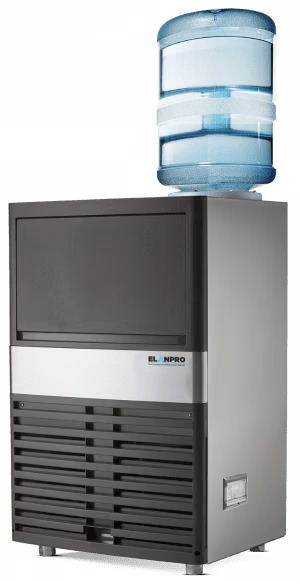Commercial ice machines are used worldwide across various food service, healthcare, and hospitality industries. Ice making machine is found in hotels, bars, restaurants, hospitals, and commercial establishments. These machines produce ice in different shapes, sizes, and forms like crushed, diced, ground, flaked, and many others.
However, like any machine that needs regular maintenance and upkeep, ice machines are no different. Ice machines come in direct contact with water and air, the two important components which have the potential to make the ice cubes unhygienic. Dirt, germs, and bacteria can build up inside and affect the ice quality produced. If this happens, the ice is not fit for human consumption anymore.
What’s making it dirty?
Ice makers come in all shapes and sizes, but their function is the same. It is essential to sanitize ice cube machines from time to time as the continuous flow of running water through the evaporator may lead to the formation of algae and mold and cause many other problems. In addition, if ice machines are not cleaned properly, undissolved minerals like limescale and calcium can build up in the machine and affect the ice’s taste and smell.
Ice machines provide a damp and dark environment ideal for mold to grow. Mold grows more rapidly when introduced to organic nutrients in the air, like flour and dust. In cafeterias, bakeries, and pizza and sandwich shops – yeast from bread making can rapidly increase mold growth in an ice machine. These can cause health complications and respiratory illnesses if left unchecked.
Bacteria and viruses may also contaminate ice-making machines, but these are usually introduced by a person handling the ice within the machine and not the machine itself. Mould, germs, viruses, and other contaminants can be removed from an ice maker’s surface and the bin’s interior by cleaning, disinfecting, and sanitizing it.
When to clean?
Most commercial ice machine manufacturers recommend that you sanitize your ice machines and the evaporators at least once every six months. But Elanpro recommends that you clean them every three months.
Additionally, the ice scoop should also be cleaned every day, the exterior of the ice machine should be cleaned every month, and the air filters need to be cleaned once every two weeks. The purge/flush setting is also a determining factor as to how much maintenance your ice machines will require. This depends upon the brand of commercial ice making machine you are using. Some machines will regulate the flushing of water based on the number of minerals present in the water, which automatically reduces deposits.
Suppose mold, algae, and mineral deposits like limescale and calcium continue to build up over time. In that case, this can spoil the machine, affect the sensor readings and reduce the efficiency of the machine. Moreover, if the condenser is dirty, the iced maker will not be able to control the heat it pulls out of the water to make ice. Dirty air filters can also be costly on the pocket as they use more electricity.
How to Clean?
Every manufacturer has different methods of cleaning and sanitizing ice machines, but generally, it involves the removal of limescale and calcium buildup from the sensors and evaporators of the ice machine’s water system. This can be done manually by cleaning and running an automated clean cycle.
A big part of sanitizing ice machines includes cleaning the condenser and emptying and wiping the bin, among other steps. There are many additional cleaners available on the market, like UV lights, sanitizers, and filters that claim to keep ice machines clean, and they can help prevent bio-organism growth. But one must ensure that these devices are compatible with their ice machine.
Using filters that are not carbon-based will ensure that the disinfection process of water remains undisturbed and that the water and ice are safe to consume. It is recommended that you call your ice machine manufacturer for easy servicing, sanitization, and proper maintenance of your ice machine.
Cleaning devices can and may work well depending on how they are installed and serviced. Taking good care of your equipment is essential for your business to flourish. These methods all have their uses, benefits, and drawbacks. Based on their requirements, one can research before investing in them.
If you’re worried about the sanitization of your Elanpro ice machines, give us a call, and we’ll be there for you. Our equipment and services are designed to suit every commercial-grade refrigeration requirement, and we will guide you through the process seamlessly.

